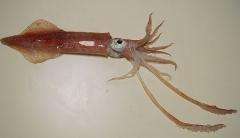February 8, 2011 report
Squid shown to be able to hear

(PhysOrg.com) -- Scientists in the US have solved the mystery about whether squid can hear and if so, how.
Marine biologist T. Aran Mooney, a post-doctoral scholar at the Woods Hole Oceanographic Institution (WHOI) in Massachusetts measured the neural response to sounds in squid fitted with electrodes to detect nerve signals from the statocysts, two sac-like sensory organs near the base of the brain in squid.
The longfin squid (Loligo pealeii) were in a tank and magnesium chloride was used to anesthetize them and keep them still, and underwater speakers (the kind used for synchronized swimmers) were used to play the sounds.
The results of the research confirm that squid can hear low-frequency sounds between 30 and 500 Hz, but there was no response if the water temperature was less than 8°C. Dr Mooney said the squid would probably be able to hear waves, the sounds of reefs, and wind above, but would not be able to hear high-frequency sounds such as echo-location signals emitted by toothed whales and dolphins, which are the main predators of the squid.
Unlike land animals, squid do not hear by detecting pressure changes produced by sound waves. Instead, they sense movements of the water that are produced by sound. Dr Mooney said the squid basically hears by detecting itself moving with the sound wave, and compared the process to a piece of fruit suspended in jelly. He said if you make the jelly wobble, the fruit moves as well as the jelly.
The statocysts are fluid-filled sacs lined with hair cells that project into the sac. A tiny calcium carbonate grain called a statolith is also present inside each statocyst. In response to motions produced by sound the hair cells touch the statolith and generate signals that are sent to the brain. The hair cells in the squid statocysts are analogous to the hair cells in the cochlear in human ears, which convert vibrations in the air to signals that are then sent to the brain.
The paper was published in The Journal of Experimental Biology. The researchers have now begun to investigate the squid’s relatively rudimentary sensory organ to see if it can shed light on the evolution of hearing in higher animals. Dr Mooney is also hoping to study the effect of “the burgeoning cacophony of human-generated sounds in the ocean” to see if it affects squid behavior or threatens their survival.
More information: Sound detection by the longfin squid (Loligo pealeii) studied with auditory evoked potentials: sensitivity to low-frequency particle motion and not pressure, by T. Aran Mooney et al., Journal of Experimental Biology 213, 3748-3759 (2010). doi:10.1242/jeb.048348
© 2010 PhysOrg.com















